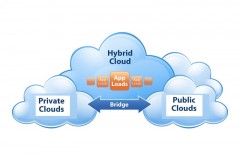 By Lori Wagoner
By Lori Wagoner
The cloud is everywhere.
The future of business and technology looks something like this: IT, as we know it, isn't going to be physical anymore.
Most data will be housed on cloud-based networks instead of owned or leased in-house servers.
John Brandon made a few predictions on CIO.com about the future of cloud adoption. “By 2020, there will be a shift from an IT department for end users to a “follow me” IT service provider mentality,” he wrote, “In other words, IT itself will move to the cloud. The concept will shift from a department that manages cloud services to a cloud service itself.”
This leaves businesses to focus on quality work, internal processes, and managing costs.
I believe the concept of cloud computing itself is dramatic. Virtual networks and remote workers are fast becoming the norm, so shared resources such as Google Apps for Business are becoming increasingly important.
The 2013 cloud computing research IDG survey revealed at least 84 percent of the companies surveyed run at least one application on the cloud.
About 42 percent of these companies have specific cloud strategies in place, and 33 percent have a moderate to aggressive approach to cloud computing.
Roughly nine percent of businesses surveyed are "aggressive" adopters of cloud computing technologies, often startups.
Why the Cloud is Compelling
The cloud allows for enhanced efficiency, automation, and reduced overhead.
It helps make businesses agile and helps them respond quickly to new market demands. It stretches the availability and accessibility of applications company-wide for collaboration and communication, especially for dispersed teams across multiple states and time zones.
Despite issues with the cloud, growth and adoption of the public cloud (services like DropBox, Google Drive, and Box.com, for example) is unmistakably evident.
But the public cloud won't do it all, and the cost associated with private, enterprise-level cloud computing can put it out of reach for most small to medium sized businesses.
The Hybrid Cloud: The Best of Both Worlds
Judith Hurwitz, Marcia Kaufman, Fern Halper, and Dan Kirsch – authors of Hybrid Cloud for Dummies – argue the hybrid cloud allows for a variety of ways to provide a "unified, automated, and well-managed computing environment."
Data can move easily between public or private clouds as needed, and access to specific data and applications can be restricted as needed. Not everyone needs access to sensitive client financials, HR data, but a marketing team in the UK needs to access files from the company headquarters in California.
Running Leaner
Bob Tarzey of TechRepublic points out some specific – but compelling – uses of the hybrid cloud model; namely, handling additional bandwidth needs for a company site or testing new applications and services.
As for the acceptance of the hybrid cloud, the whole world is recognizing it now. Gartner argues the use of hybrid cloud is imperative for businesses of all size. It's one of the defining trends of 2014 as businesses have an increasingly mobile and virtual workforce.

ليست هناك تعليقات:
إرسال تعليق